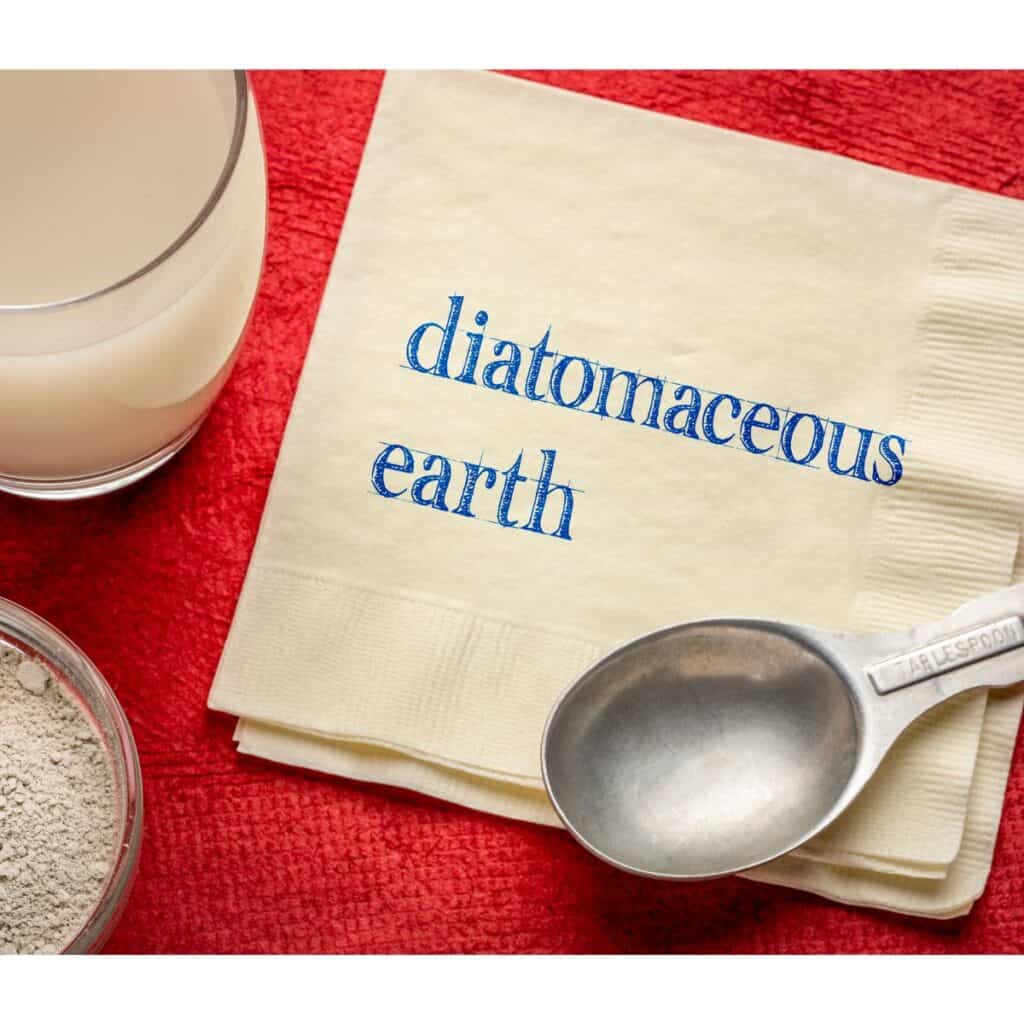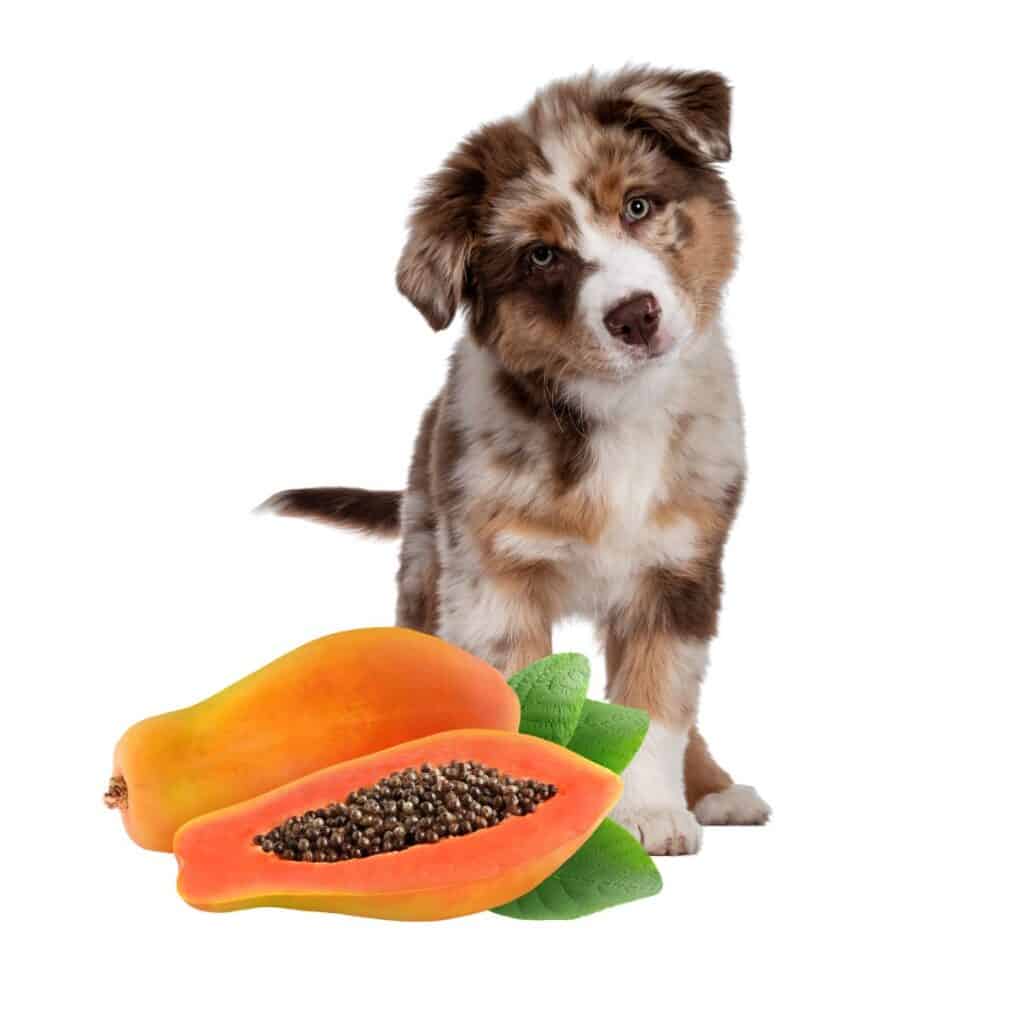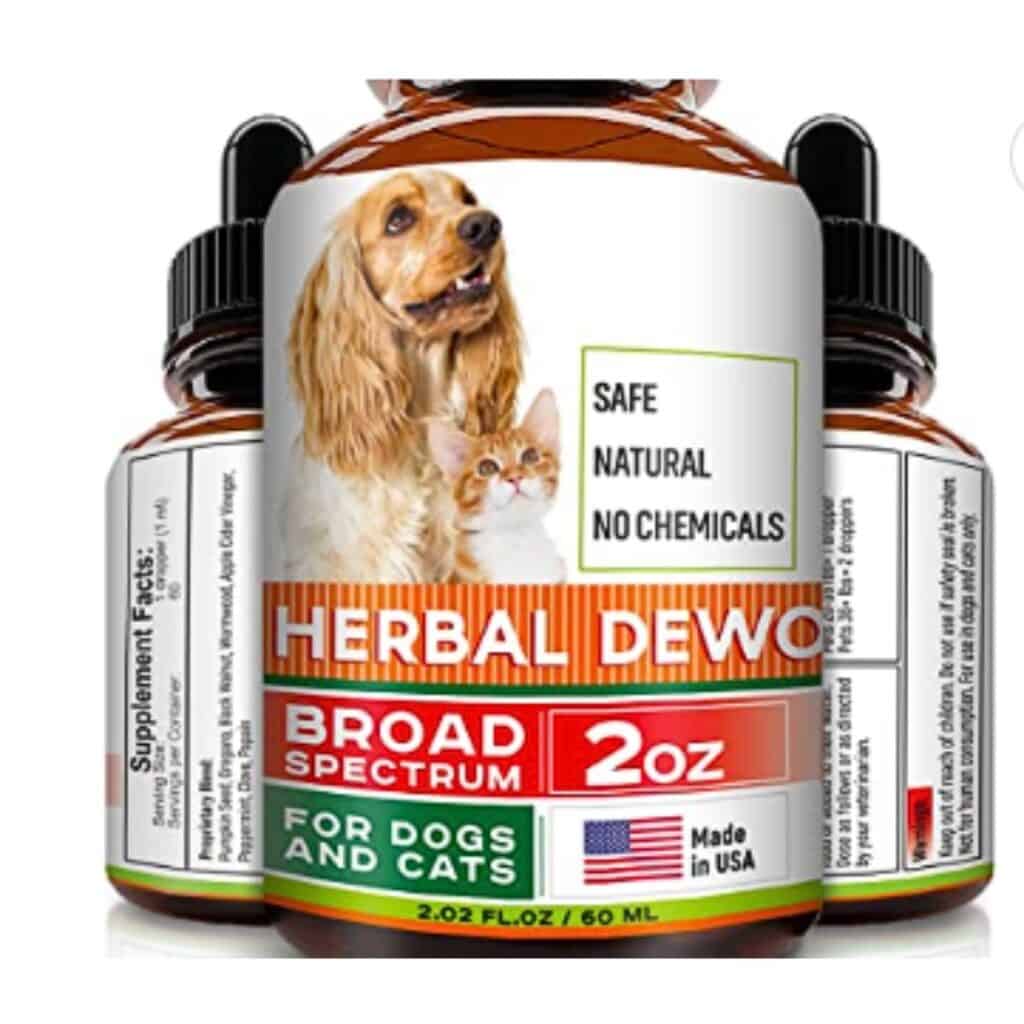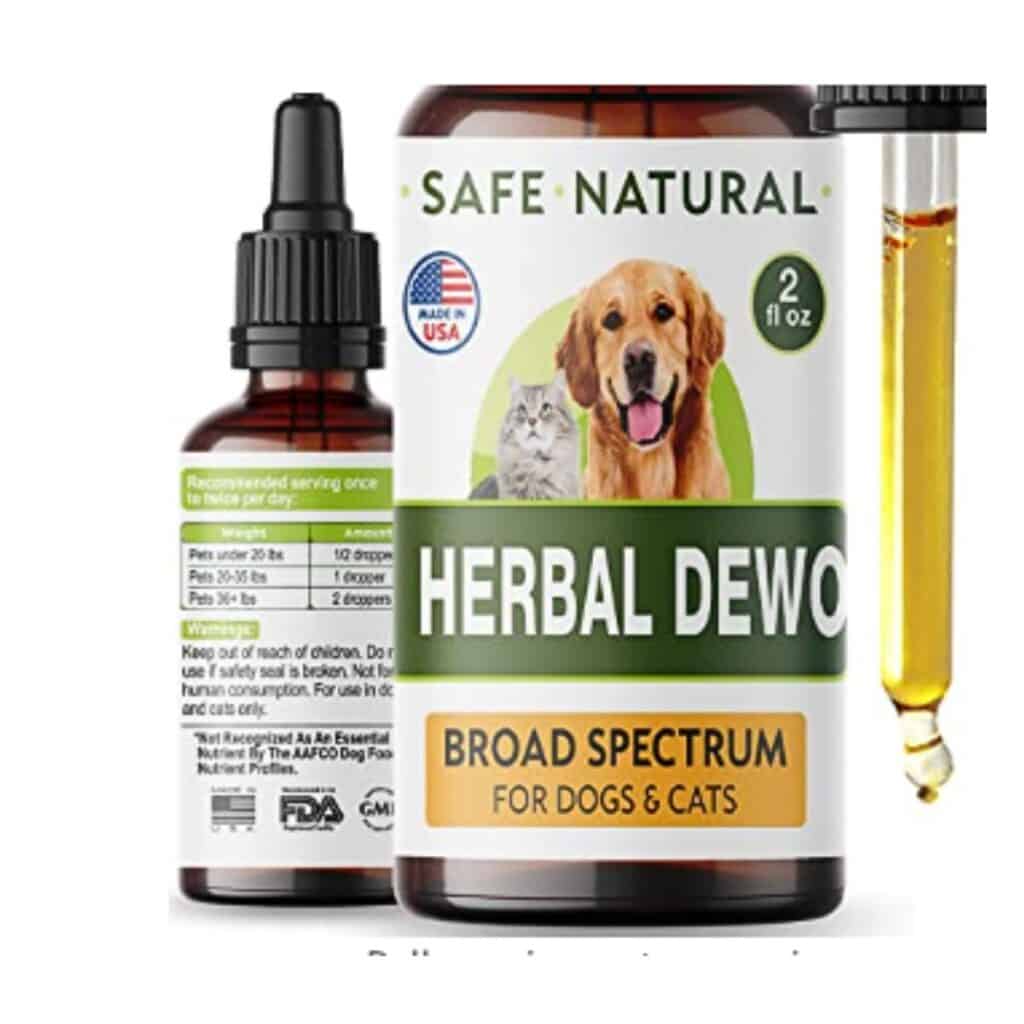Worms – just the thought of them is enough to make any dog parent cringe. These pesky parasites can cause a range of health problems in our furry friends, (including cat friends) and our families from diarrhea and vomiting to weight loss and anemia. But while chemical wormers may be effective, they can come with their own set of side effects.

That’s why many pet parents are turning their focus to preventive measures and pet testing to ensure that treatment is necessary along with natural remedies as a safer, gentler solution to keep their dogs worm-free. In this article, we’ll introduce you to 9 natural dog wormers that you can try right now. From pumpkin seeds to diatomaceous earth, these remedies are not only effective, but they also offer a range of other health benefits for your pup. So, let’s dive in and learn how to kick those worms to the curb, naturally!
Symptoms of Worms
As we discuss in our article the Signs and Symptoms of Worms in Dogs, the symptoms of worms in dogs are essentially those that express that your dog is poor, not getting enough nutrients and that there is an intruder in their body using its host, your dog. The symptoms can vary depending on the type of worm infestation, for instance, heartworms are slightly different symptoms.
Ultimately, worms are a common problem in dogs, and if left untreated, they can lead to serious health issues. Here are some signs and symptoms of worms in dogs:
- Weight loss: Worms can consume a significant portion of a dog’s nutrients, leading to weight loss despite an unchanged diet.
- Vomiting: Some worms can cause gastrointestinal irritation leading to vomiting, either with or without food in the vomitus.
- Diarrhea: Worms can irritate the gastrointestinal tract, causing diarrhea. Diarrhea can also lead to dehydration and electrolyte imbalances.
- Poor coat condition: Worms can cause a dog’s coat to become dull and rough.
- Abdominal bloating: In severe cases, worms can cause abdominal distension and discomfort.
- Anemia: Some worms, such as hookworms, can cause blood loss leading to anemia, characterized by pale gums and lethargy.
- Coughing: Certain types of worms, such as lungworms, can cause coughing and respiratory distress.
It’s important to note that not all dogs with worms exhibit symptoms, and some dogs may show only mild signs or none at all. Therefore, regular fecal examinations and worming are essential for maintaining good canine health.
A study published in the Journal of Small Animal Practice found that nearly 30% of dogs in the UK were infected with intestinal parasites, and the most common species identified were roundworms, hookworms, and whipworms. The study emphasizes the importance of regular fecal examinations and appropriate deworming protocols to prevent parasitic infections and associated health issues in dogs (Little et al., 2010).

Why Natural Dog Wormers?
Regular dog wormers are typically effective in treating and preventing worm infestations in dogs. However, like any medication, they may have side effects, such as vomiting, diarrhea, loss of appetite, and lethargy. Some dogs may also be allergic to the ingredients in wormers, which can lead to more severe reactions, including anaphylaxis.
Natural wormers, on the other hand, may be a good choice for dog owners who are looking for a safer and more natural alternative. These products are made from natural ingredients, such as herbs, spices, and essential oils, which are thought to help prevent and treat worm infestations.
Research is even supporting the use of Natural wormers, a study published in the Journal of Veterinary Science and Technology found that natural wormers, such as garlic and pumpkin seeds, were effective in reducing the number of worm eggs in dogs’ feces. The study also noted that natural wormers were less toxic than traditional wormers and had fewer side effects (Kumar et al., 2021).
Puppies are particularly vulnerable to worm infestations, and it’s essential to deworm them regularly to prevent serious health issues. However, just like newborn babies we recognize that small beings like puppies and babies may be more sensitive to the chemicals including the harsh chemicals in traditional wormers, making natural wormers a safer choice. Further, we know that puppies are recommended to be wormed a lot in the early years which causes the chemicals to add up.
Natural wormers may be a safer and more natural alternative to traditional dog wormers, especially for puppies and dogs with sensitivities to chemicals. However, it’s important to consult with a veterinarian and use natural wormers responsibly.
Best Natural Dog Wormers and How to Use Them
Natural wormers can be a safe and effective alternative to traditional dog wormers. Here are nine different natural wormers and how to use them:
Diatomaceous earth
Diatomaceous earth is a fine powder made from fossilized algae. It is believed to kill worms by dehydrating them. Add 1 tsp to 1 tbsp to your dog’s food once a day. It’s effective against roundworms, hookworms, whipworms, and tapeworms.
Diatomaceous earth (DE) is a fan favorite at Popular Pets, we use it to rid mites in the chicken coop and stave off fleas and ticks it has been used for many years as a natural remedy for a variety of ailments in both humans and animals. The use of DE dates back to ancient Greece and Rome, where it was used as a natural insecticide and for other medicinal purposes.
When it comes to dogs, DE can be used for a variety of purposes. One of the most common uses is as a natural wormer but in addition DE can be used as a natural insecticide to control fleas and ticks on dogs. DE can be used to control odors in the dog’s environment. It can be sprinkled on carpets, bedding, and other areas where odors are a problem and DE can be added to the dog’s food to promote healthy skin and coat. It contains silica, which is important for healthy skin, hair, and nails.
DE, along with CBD can be added to the dog’s food to support joint health. It contains minerals like calcium, magnesium, and zinc that are important for healthy bones and joints.

Garlic
Garlic is thought to have antiparasitic properties. A study in Journal of Animal and Veterinary Advances, found that garlic supplementation reduced the number of eggs in the feces of dogs infected with roundworms and hookworms (Alzaidi, S. A., 2017).
How to deworm a dog with garlic?
Crush one clove of garlic and mix it with your dog’s food once a day. It’s effective against hookworms, roundworms, and tapeworms.
Pumpkin seeds
Pumpkin seeds contain an amino acid called cucurbitacin that is toxic to certain types of worms. Crush 1 tsp of pumpkin seeds and mix them with your dog’s food once a day. It’s effective against tapeworms and roundworms.
A study in Veterinary World found that pumpkin seeds were effective in reducing the number of eggs in the feces of dogs infected with roundworms (Dar, S. A. et al., 2018).
Black walnut
Black walnut is believed to have antiparasitic properties. Add 1/4 tsp to 1 tsp of black walnut tincture to your dog’s food once a day. It’s effective against tapeworms, roundworms, and hookworms.
Take care with black walnut as some naturopathic practitioners believe that black walnut can be toxic when given to pets in certain ways.
Cloves
Cloves are thought to have antiparasitic properties. Add 1/4 tsp to 1 tsp of ground cloves to your dog’s food once a day. It’s effective against roundworms and hookworms. There is much internet lore regarding the toxicity of cloves, be careful when using cloves and review our article on the risks and concerns here. Cloves is used for other natural remedies as well including
Papaya
Papaya contains an enzyme called papain that is toxic to worms. Mix 1/4 cup of mashed papaya with your dog’s food once a day. It’s effective against roundworms and tapeworms. This is an excellent way to also add some veggies and nutrients to your pet’s food as papaya is also packed with vitamin C.

Thyme
Thyme is believed to have antiparasitic properties. Add 1 tsp of fresh or dried thyme to your dog’s food once a day. It’s effective against roundworms and hookworms. Researchers in Spain published an article in the Journal of Ethnopharmacology that identified thyme as a plant traditionally used to treat gastrointestinal parasites in livestock (Fernandez-Soto, P. 2020).
Turmeric
Turmeric is thought to have antiparasitic properties. Add 1/4 tsp to 1 tsp of turmeric powder to your dog’s food once a day. It’s effective against roundworms and hookworms.
Turmeric has additional benefits for dogs other than a homeopathic remedy for worms such as lowering blood sugar, reducing inflammation and should be an all round supplement that pet lovers should consider.

Wormwood
Wormwood is believed to have antiparasitic properties. Add 1/4 tsp to 1 tsp of wormwood tincture to your dog’s food once a day. It’s effective against roundworms, hookworms, and tapeworms.
Researchers that published an article in the Journal of the South African Veterinary Association, found that a herbal wormer containing wormwood was effective in reducing the number of parasite eggs in the feces of dairy goats (Lange., K. et al. 2017)
It’s important to note that natural wormers may not be effective against all types of worms, and some may be harmful or toxic to dogs. It’s essential to consult with a veterinarian before using any natural wormers to ensure they are appropriate for your dog’s specific needs and medical history.
Best Home Remedy For Dog Worms
Overall, in our experience the best home remedy for dog worms is Diatomaceous earth, this versatile wormer takes a bit of time to work but does in fact work which is a huge win! If I was not able to use DE, I would select one of these store bought natural wormers that use many of the ingredients described above all in one wormer.
Natural Wormers for Dogs: Store Bought
If dosing and preparing natural dog wormers seems a bit much or you are not sure which one to select, several pet companies have come to the rescue with pre-made natural dog wormers you can buy with clear instructions. Here are a few to try:
Herbal Dewormer Broad Spectrum for Cats and Dogs
This Wormer contains many of the recommended herbal dog worm provided above including Pumpkin Seed, Oregano, Black Walnut, Wormwood, Apple Cider Vinegar, Peppermint, Clove, Papain and is available on Amazon here. You can add this liquid to pet food for a natural de-wormer.

TwoFurFinds Herbal Dewormer
This herbal dewormer or intestinal cleanse also contains many of the natural dog wormers described above and includes Pumpkin Seed, Oregano, Black Walnut, Wormwood, Apple Cider Vinegar, Peppermint, Clove, Papain also in a liquid form to easily administer to your dog and is available on Amazon here.

Conclusion
Wrangling worms in your furry best friend can be difficult, but chemical wormers can come with their own set of side effects. That’s why natural remedies for dog worms are a popular choice for pup parents who want a safer, gentler solution.
From pumpkin seeds to garlic, natural remedies offer a range of options to help rid your dog of pesky parasites. And let’s not forget about diatomaceous earth – this food-grade powder not only kicks worms to the curb, but it can also help control fleas, odors, and support skin and joint health.
Remember, natural remedies are great, but they shouldn’t replace regular veterinary care. Some types of worms may require stronger medication or medical intervention, so always consult with your vet if you suspect your pup has a parasite problem.
In a nutshell, natural remedies for dog worms can be a safe and effective way to keep your dog happy and healthy. So, kick those worms to the curb and enjoy a parasite-free life with your furry friend!
Looking to learn more about taking charge of your Dog’s Health? Learn about Pet Testing from The Popular Pets. Now offering pet testing for your the health of your pet and your peace of mind. Learn more about pet testing options.
You may also be interested in the Ultimate Guide to Heartworm
Diatomaceous Earth for Dogs and Cats FAQ
Diatomaceous earth is great for dogs and is safe to ingest and put on their skin, sniffing diatomaceous earth is not a problem but dog owners do need to be careful that dogs do not inhale DE further. The silica in DE can be harmful to dog and cat lungs, especially pets with respiratory issues. The many benefits of DE make it a useful pet wellness tool.
Since DE is an excellent addition to food due to its ability to kill parasites, bind collagen and support a healthy coat and joints, licking DE is not only beneficial but suggested. DE is safe for dogs but dog lovers should get food grade DE to be safe.
Diatomaceous earth will not harm dogs. DE is non-toxic and actually helpful for dogs due to its many wellness attributes. Pet lovers have found many benefits to adding DE to their pet’s food to help support a healthy coat and fend off parasites and on externally to help with fleas and ticks.
References
Little, S. E., Johnson, E. M., Lewis, D., Jaklitsch, R. P., & Payton, M. E. (2010). Veterinary teaching hospital’s role in detecting gastrointestinal parasites affecting dogs in the United States. Journal of Small Animal Practice, 51(12), 636-642.
Kumar, A., Singh, M., Singh, G., Singh, M., & Singh, R. (2021). Comparative efficacy of natural and chemical dewormers in dogs. Journal of Veterinary Science and Technology, 12(3), 103.
Alzaidi, S. A., Al-Khalifa, M. S., Al-Humaidi, A. A., & Al-Qahtani, A. A. (2017). Effect of garlic (Allium sativum) on gastrointestinal parasites in dogs. Journal of Animal and Veterinary Advances, 16(9), 354-357.
Dar, S. A., Yatoo, M. I., Sharma, R. A., Gopalakrishnan, A., & Saxena, A. (2018). Antihelminthic efficacy of pumpkin seeds (Cucurbita pepo) against gastrointestinal nematodes in naturally infected dogs. Veterinary World, 11(5), 656-661
Fernandez-Soto, P., Velasco-Rodriguez, R., Diaz-Cao, J. M., Morgado-Carrasco, D., & Blanco-Penedo, I. (2020).

